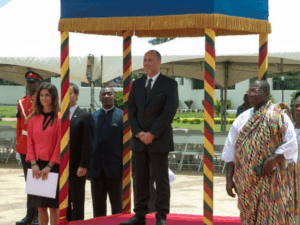Hungary to launch ‘Opening to the South’ policy

Mr András Szabó, Ambassador of Hungary, says his country recognises the great potential of Africa, hence the strategy to launch a new strategy called: “Opening to the South.”
“The main objective of this new policy is to diversify our economic relations, through closer political ties and increased commerce with emerging economies in Africa and South America.
“Within the new framework of our foreign policy Africa gained a prominent place.
“We intend to strengthen our presence in Sub-Saharan Africa by opening new diplomatic missions and economic representations, called national trading houses as well as intensifying our bilateral political dialogue,” he said.
Mr Szabó, who was speaking at the FlagStaff House in Accra, when he presented his Letters of Credence to President John Dramani Mahama said as a first milestone of this initiative, his country opened an embassy in Addis Ababa in January, accredited to the African Union, the political capital of Africa.
The next step was the re-establishment of the embassy in Accra in April, after 30 years.
“Our relations with Ghana have always been laid on the strong foundation of mutually advantageous partnerships.
“Hungary’s contribution to the development was insured by the numerous educational possibilities and scholarship programmes, due to which several of Ghanaian students pursued their education in Hungary,” he said.
He said in order to follow the success of the past, Hungary has offered 50 scholarships every year to Ghanaian students to study engineering, science, medicine and agro-industry, effective September this year.
Due to the new Africa policy, relations between Ghana and Hungary for the past two years have been deepened with the reciprocal visits of the foreign ministers of both countries.
A number of agreements including Economic Co-operation have also been signed providing the legal framework for a Joint Economic Commission.
Mr Szabó, said Hungary is exploring the renewal energy, water management, IT, waste management, construction, agriculture and food processing sectors in Ghana, in order to build strong investment projects in the country.
He said the motivation is based on Ghanaians with the orientation to build a win-win situation in the field of economics and trade relations.
He said: “Hungary wishes to work together with Ghana in the field of security, one of the areas can be the cooperation on cyber security.
“Hungary can also assist Ghana with its special technology to solve housing problems by investing in production units locally and using local materials as well.
Hungary has managed to introduce innovative revenue generation models that cause limited political and social impact. There might be some interesting and new ways to create income for Ghana.”
The Ambassador said Ghana’s democratic credentials, stability and economic growth makes the desire of Hungary to invest in the areas feasible.
“We believe that sports can build a bridge between Europe and Africa, therefore we find the development of sports relations both on the level of clubs and associations and in business an area of outmost importance.
“Hungary intends to bolster regular contact, foster exchange programmes and offer its expertise in training methods and infrastructure development for our Ghanaian partners.”
Mr Szabó said Ghana and Hungary have a common point in the history of football. József Ember was a Hungarian football coach who managed the national football team of Ghana from 1960 to 1962.
On May 9, Zoltán Balog, Minister of Human Capacities of Hungary and Nii Lante Vanderpuye, Minister of Youth and Sports of Ghana signed the Memorandum of Understanding on Co-operation in the Fields of Sports and Youth in Accra.
He said Hungary is ready to share experience in swimming, water polo, kayak-canoeing, judo and archery with its Ghanaian partners.
Hungary in addition has a solid know-how for stadium constructions and operating football academies and also willing to share knowledge in the field of e-coaching.
Source: GNA
